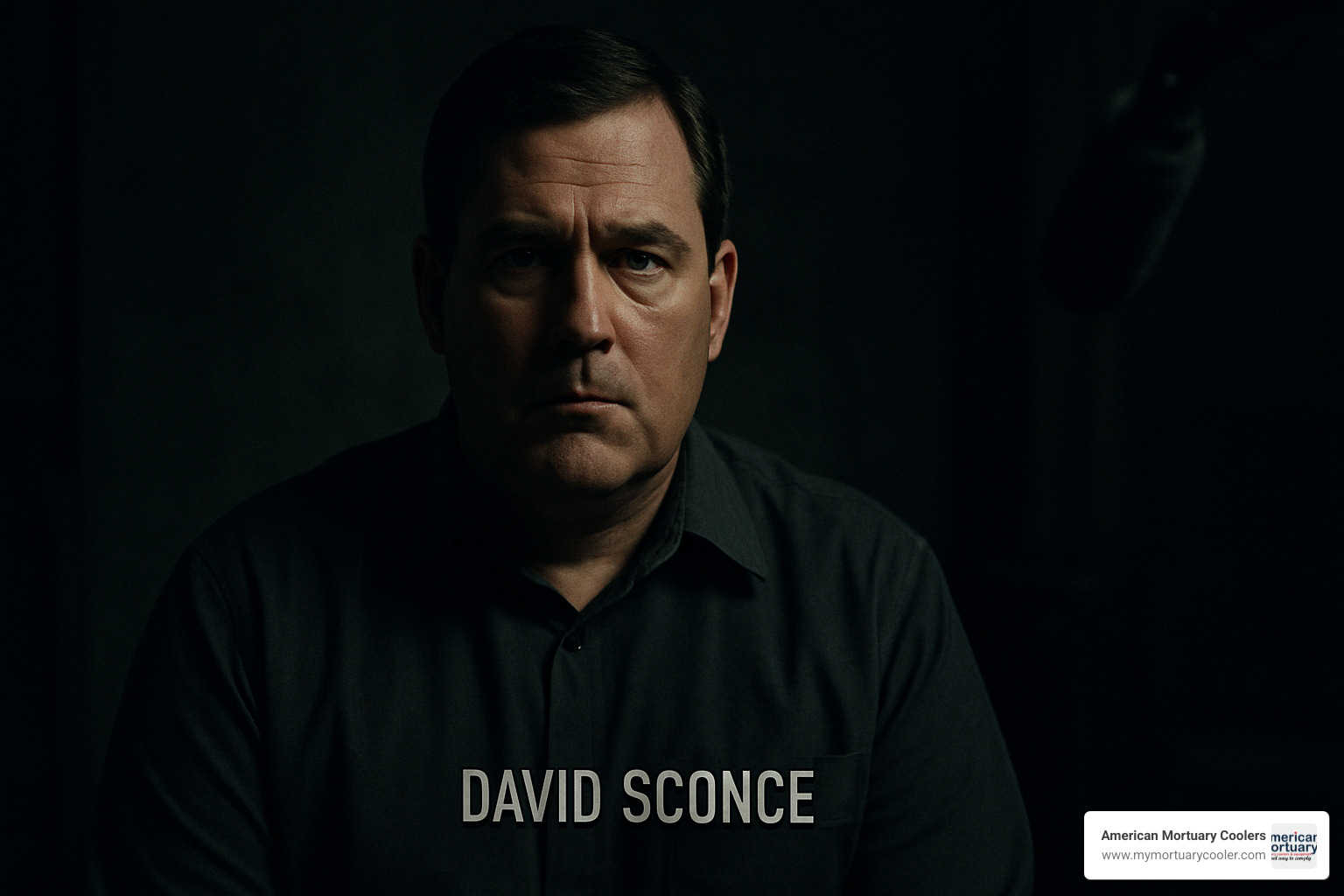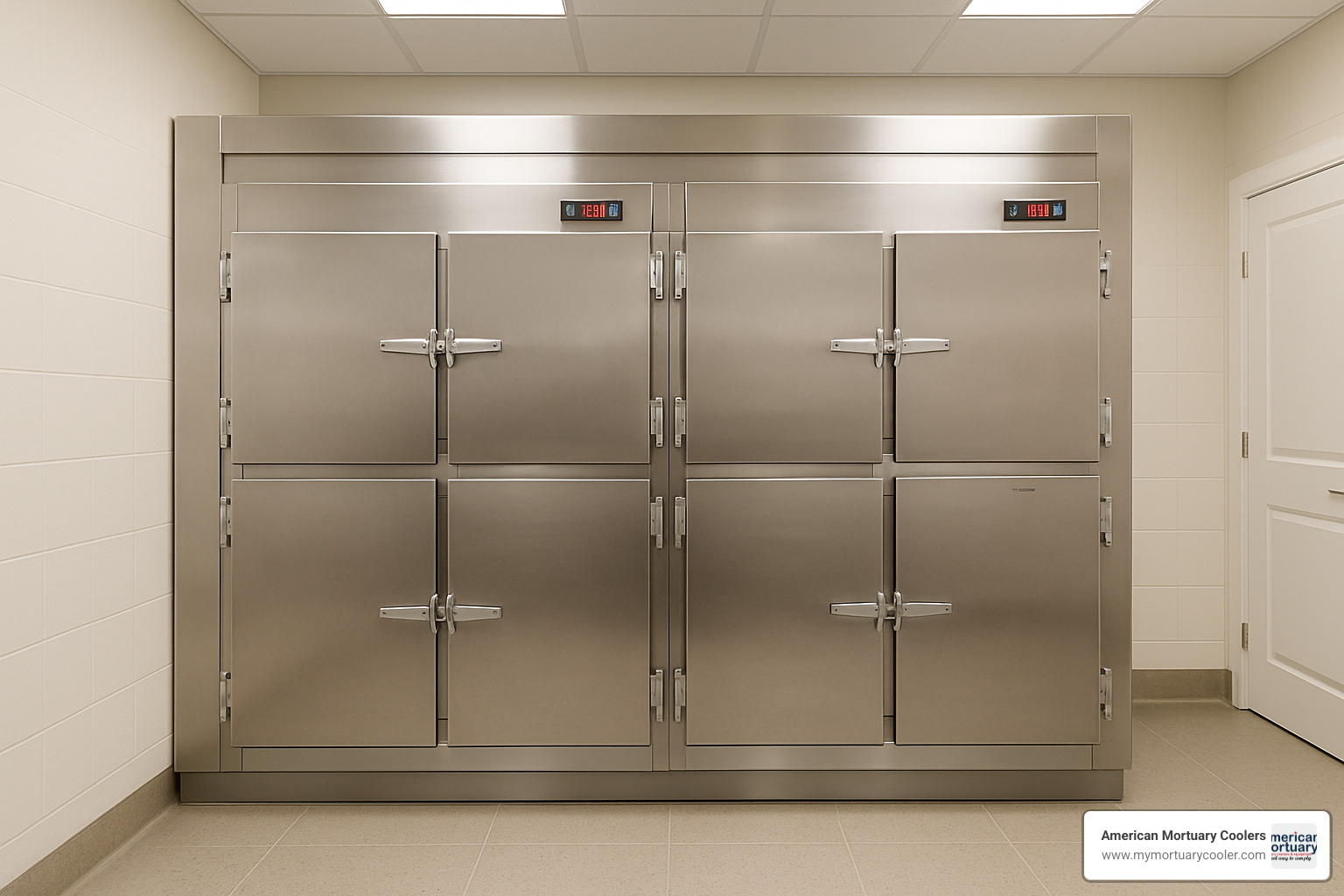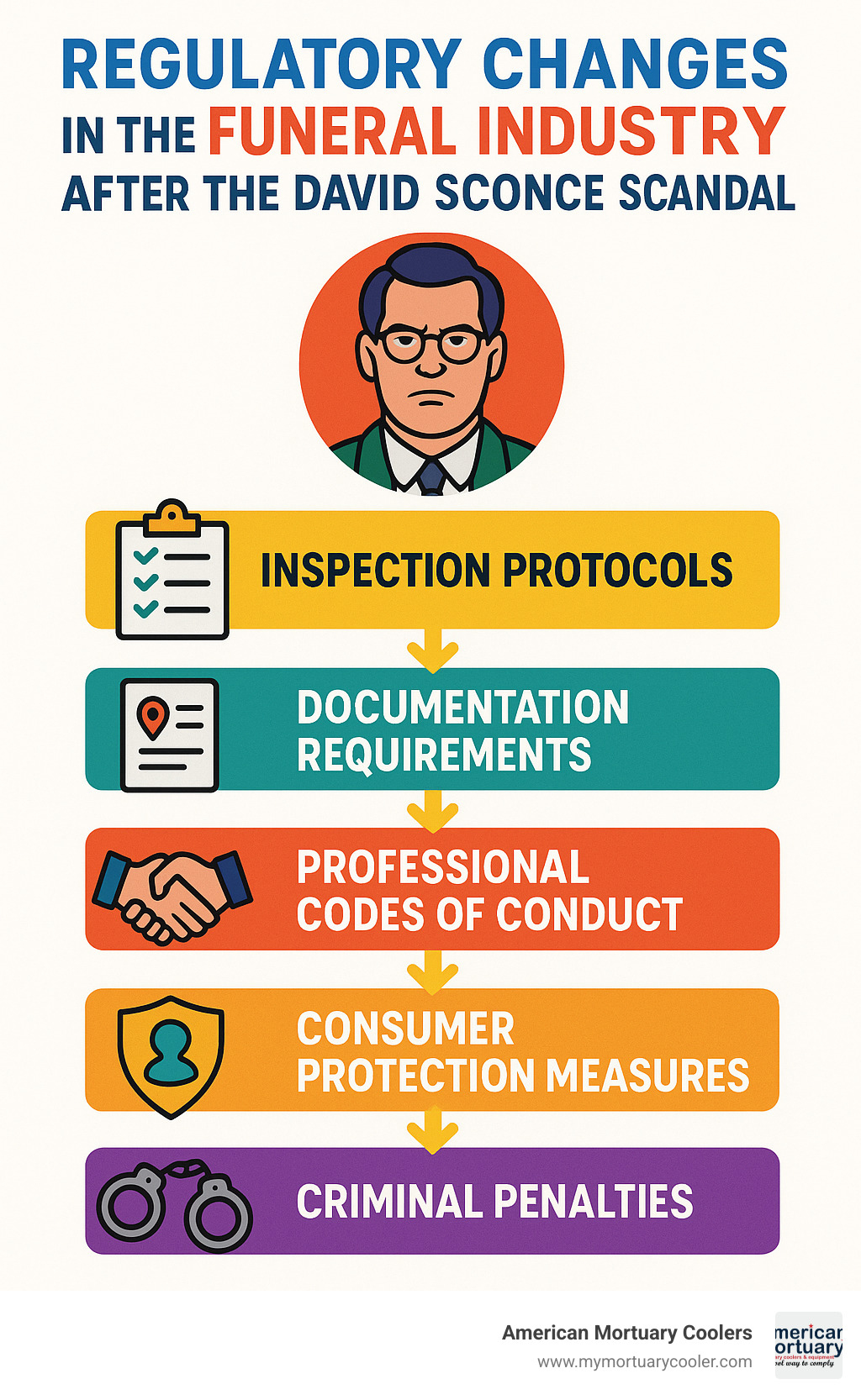
Everything You Need to Know About David Sconce
The Disturbing Legacy of a Rogue Funeral Director
David Sconce was a former funeral director who operated the Lamb Funeral Home in Pasadena, California during the 1980s and became infamous for one of the most shocking scandals in funeral industry history.
| Key Facts About David Sconce |
|---|
| Operated: Lamb Funeral Home in Pasadena, CA (family business) |
| Primary Crimes: Mass unauthorized cremations (150-200 bodies at once), corpse mutilation, theft of dental gold, hiring enforcers to assault competitors |
| Sentencing: 5 years in 1989 (served 2.5 years); later received 25 years to life in 2013 for probation violation |
| Current Status: Released on parole in 2023 |
| Industry Impact: Led to new regulations including unannounced crematory inspections and laws making dental gold theft a felony |
The case gained renewed attention with HBO's 2025 documentary series "The Mortician," which explores how Sconce transformed a respected family business into a criminal enterprise that violated the most basic ethical standards of funeral service.
"I don't put any value on anybody after they're gone," Sconce himself stated in documentary interviews, revealing the disturbing mindset that allowed him to treat human remains with such callous disregard. His operation charged as little as $55 per cremation while competitors charged significantly more—a price difference made possible by his horrific practice of cremating up to 200 bodies simultaneously.
I'm Mortuary Cooler, a national-level supplier of mortuary refrigeration equipment who has studied the David Sconce case extensively as part of our commitment to promoting ethical standards in the funeral industry. The Sconce scandal demonstrates why proper equipment, procedures and oversight are essential to maintaining dignity in death care.

Quick David Sconce definitions:
David Sconce: Origins and the Lamb Funeral Home Legacy
The Lamb Funeral Home in Pasadena, California wasn't always synonymous with scandal. Before David Sconce transformed it into the epicenter of funeral industry horrors, it stood as a pillar of the community – a trusted family business where generations of Pasadena residents said their final goodbyes to loved ones.
The funeral home's story began decades before the scandal broke, built on principles of dignity and respect. Its reputation was sterling until the early 1980s, when the third generation of the family – David Sconce – began steering the business in a disturbing new direction.

Early Career of David Sconce
Unlike many who enter funeral service with a sense of calling or compassion, David Sconce seemed to stumble into the family business. Born and raised in Pasadena, young Sconce first chased athletic dreams, earning a football scholarship to college before eventually returning to the family fold.
"The funeral business was in his blood, but not in his heart," one former colleague later remarked. While most funeral directors speak of their profession with reverence, Sconce approached it with cold calculation.
After completing mortuary school – a requirement for licensure – Sconce began taking on more responsibilities at Lamb Funeral Home. Those who worked alongside him noted his unusual detachment from the emotional aspects of funeral service. While most directors develop coping mechanisms that allow them to remain compassionate without becoming overwhelmed, Sconce seemed to lack basic empathy for grieving families.
This emotional distance would later enable him to commit acts that would horrify even the most seasoned funeral professionals.
Growth Plans & Aggressive Business Tactics
As his influence grew within the family business, David Sconce implemented an ambitious expansion centered on a simple but ultimately sinister business model: discount cremations at prices competitors couldn't possibly match.
Sconce advertised cremations for as little as $55 – a fraction of what other funeral homes charged. This price point raised eyebrows throughout the Pasadena funeral community. Directors at competing establishments did the math and realized something wasn't adding up.
"You simply can't provide a dignified individual cremation at that price point and keep the lights on," explained one industry veteran. "We all wondered what corners he was cutting."
The answer, as investigators would later find, was all of them.
Sconce's marketing tactics grew increasingly aggressive. He initiated pricing wars with established funeral homes and marketed directly to price-sensitive consumers. His approach was less about serving families and more about capturing market share at any cost.
Perhaps nothing better symbolized Sconce's inappropriate attitude toward his solemn work than his personal vehicle – a Corvette sporting a vanity license plate reading "I BRN 4U." What he likely intended as dark humor instead revealed a profound disrespect for the deceased in his care.
This cavalier attitude, combined with his relentless pursuit of profit, would set the stage for atrocities that would forever change how the funeral industry is regulated. As one investigator later put it, "When you stop seeing the humanity in human remains, there's no limit to the desecration that follows."
Anatomy of the Scandal: Crimes and Cover-Ups
The truth behind David Sconce's funeral home operation unfolded like a macabre mystery novel. What began as whispers among industry professionals eventually erupted into one of the most disturbing scandals the funeral industry had ever seen.
When investigators finally dug into the operations at Lamb Funeral Home, they finded not just isolated incidents but a systematic criminal enterprise. Bodies weren't being treated with dignity – they were being mutilated, dismembered, and altered to fit more remains into cremation chambers at once. Instead of individual cremations, Sconce was cramming an astonishing 150-200 bodies into ovens simultaneously, treating human remains like bulk waste.
Perhaps most shocking was the organized theft operation. Gold dental fillings, jewelry, and other valuables were systematically stripped from bodies before cremation. This wasn't occasional opportunism – it was standard procedure, with the stolen items later sold for profit.
When competitors started asking uncomfortable questions, Sconce didn't hesitate to resort to intimidation. He hired enforcers – actual strongmen – to threaten and physically assault funeral directors who dared question his impossibly low prices.
The operation even extended beyond the funeral home's walls. Investigators finded a remote desert burn site where Sconce conducted mass cremations away from prying eyes, free from any oversight or regulation.

How David Sconce Engineered Mass Cremations
The mechanics of Sconce's operation revealed a disturbing efficiency. Bodies arrived at the funeral home and immediately entered a production line of disrespect. Staff would first strip the deceased of anything valuable – clothing, jewelry, dental work – essentially mining the dead for profit.
Then came the most horrific part: rather than individual cremations, bodies were stacked and piled into cremation chambers. Sometimes 150-200 bodies would be burned together, their ashes completely mixed. Families later received random scoops of these commingled remains, believing they were receiving their loved one's individual ashes.
The workplace culture Sconce fostered was equally disturbing. Employees held actual contests to see who could fit the most bodies into a single cremation load – turning what should be a dignified final service into a grotesque competition.
"I could cremate one guy in two hours, or you could put 10 of them in there and take two and a half hours," Sconce once explained, revealing the cold business calculation behind his operation. This efficiency allowed him to process far more bodies at a fraction of the cost, maximizing profits while completely violating the trust placed in him.
At American Mortuary Coolers, we believe proper care begins with proper equipment. Adequate refrigeration systems are essential to maintaining dignity and preventing the kind of desperate shortcuts that defined Sconce's operation.
Whistleblowers & Investigators Who Exposed David Sconce
The house of cards began tumbling down thanks to competing funeral directors who couldn't make sense of Sconce's business model. How could anyone offer cremations so cheaply and still keep the lights on? The math simply didn't add up.
The case broke wide open thanks to an unlikely hero – a World War II veteran who had helped liberate Auschwitz. While near Sconce's desert cremation site, this veteran recognized a smell no one should ever have to recognize twice: the distinctive odor of burning human flesh. Horrified, he contacted authorities immediately.
The Pasadena Police Department began investigating, soon joined by the Los Angeles County District Attorney's office. What they uncovered through financial records, employee testimonies, and physical evidence painted a comprehensive picture of industrial-scale disrespect for the dead.
Former employees eventually broke their silence, providing devastating accounts. One particularly disturbing testimony came from Sconce's ex-wife, who described finding him in their garage, hammer in hand, cracking teeth to extract gold fillings – bringing his work quite literally home with him.
David Sconce's Own Justifications
The most chilling aspect of this case might be David Sconce's own explanations for his actions, which he's shared in various interviews over the years.
"Ashes have no value," Sconce would claim with an unsettling casualness. He argued that families scattering ashes at sea wouldn't notice any difference in commingled remains – completely missing the profound emotional significance these remains hold for grieving families.
When questioned directly about mixing remains in the HBO documentary, Sconce displayed an almost clinical detachment: "So what would be the difference?" he asked rhetorically. "There is none," he answered himself, revealing a fundamental disconnect from the emotional and ethical dimensions of funeral service.
For Sconce, it all came down to dollars and cents. By charging $55 per cremation while processing hundreds of bodies simultaneously, he created an extremely profitable operation. The human cost – the violation of trust, dignity, and professional ethics – simply didn't factor into his business model.
Justice Served: Trials, Sentences, and Industry Reforms
The hammer of justice finally fell on David Sconce in 1989 when he stood before the court and pled guilty to 21 counts related to his funeral home horrors. The charges painted a grim picture: mutilating corpses, conducting those shocking mass cremations, and even hiring muscle to rough up three competing funeral directors who threatened his operation.
For these disturbing violations of trust, Sconce received a five-year prison sentence—though he ended up serving only about half that time before walking free. Many families affected by his crimes felt this punishment barely scratched the surface of justice for what he had done.
Life wasn't finished with Sconce, though. In 2013, his past caught up with him when he violated his lifetime probation by possessing a firearm. This mistake proved costly. Under California's three-strikes law, the judge handed down a much stiffer sentence: 25 years to life. After serving about a decade behind bars, Sconce was granted parole in 2023.

While Sconce paid his personal debt to society, his case left a permanent mark on the funeral industry itself. Lawmakers, horrified by what had happened at Lamb Funeral Home, crafted new regulations to prevent similar abuses. These included mandating surprise inspections of crematories (no more time to hide evidence), and passing legislation that made stealing dental gold or silver from human remains a felony offense.
The HBO original documentary series "The Mortician," released in June 2023, brought renewed attention to the case and its lasting impact, as noted in the HBO original press release.
Regulatory Ripple Effects After David Sconce
The David Sconce scandal didn't just change one man's life—it transformed an entire industry. In California, where the horrors first came to light, regulators moved quickly to close the loopholes that had allowed such abuses.
Unannounced inspections became the new norm, with regulatory agencies gaining authority to show up at crematory facilities without warning. This simple change removed the opportunity for unscrupulous operators to hide illegal practices when they knew inspectors were coming.
Documentation requirements tightened significantly too. New regulations created strict chain-of-custody rules for tracking human remains throughout the cremation process. No more mysterious commingling or "losing track" of whose remains were whose.
Perhaps most importantly, laws now explicitly required that bodies be cremated individually, with thorough cleaning of equipment between cremations. The mass cremations that formed the backbone of Sconce's business model became explicitly illegal.
The National Funeral Directors Association (NFDA) responded by strengthening its Code of Professional Conduct, placing greater emphasis on the ethical handling of human remains. The ripples from the Sconce case spread far beyond California's borders, raising standards nationwide.
At American Mortuary Coolers, we understand how proper equipment supports these important regulations. Our reliable mortuary refrigeration systems help funeral homes maintain dignity and integrity in their operations. When funeral homes have adequate refrigeration capacity, they're never tempted to cut corners due to time or space constraints—the very factors that contributed to the Sconce scandal.
The case serves as a sobering reminder of why proper equipment, oversight, and ethical standards aren't just regulatory checkboxes—they're essential safeguards that protect both the dignity of the deceased and the trust of grieving families.
Lasting Aftermath: Families, Profession, and Media Spotlight
The David Sconce scandal left wounds far deeper than just regulatory changes. For families who trusted Lamb Funeral Home with their loved ones, finding the truth was devastating. Many experienced a second wave of grief – one that could never fully heal.
"They violated and desecrated my father. It's unconscionable," shared one former client in HBO's documentary. This heartbreaking sentiment echoed across countless families who realized the ashes they'd scattered at sea, placed in urns on mantels, or buried in memorial gardens might not belong to their loved ones at all.
The funeral profession as a whole took a painful hit to its reputation. While the vast majority of funeral directors operate with genuine compassion and strict ethical standards, the David Sconce case exposed vulnerabilities that made the public question who they could trust during their most vulnerable moments.

The communities affected have been on a long journey toward healing. For many families, the most painful aspect remains the uncertainty – never knowing for sure what actually happened to their loved one's remains. It's a wound that time can soften but never completely close.
When HBO released "The Mortician" in 2025, it brought the case back into public consciousness, serving as both a sobering warning and a reminder of why vigilance matters when choosing funeral providers.
How "The Mortician" Portrays David Sconce
HBO's three-part documentary "The Mortician" offers the most in-depth look at the David Sconce case we've seen to date. Director Joshua Rofé crafted what HBO describes as "a chilling story about the business of death," using noir-inspired cinematography that perfectly captures the dark nature of the scandal.
What makes the series particularly unsettling is David Sconce himself. Through extensive interviews, viewers witness his matter-of-fact descriptions of horrific actions, often delivered without apparent remorse. These first-person accounts provide a disturbing window into the mind of someone who could commit such violations.
The documentary weaves together multiple perspectives – former Lamb Funeral Home employees sharing what they witnessed, competing funeral directors who helped expose the operation, heartbroken family members, and the investigators who pieced everything together. Rofé's approach gives viewers space to form their own judgments about the profound ethical breaches.

Lessons for Today's Funeral Professionals After David Sconce
The David Sconce case offers vital lessons that today's funeral service professionals can't afford to ignore.
First and foremost, ethical standards must be paramount. No financial pressure, no matter how intense, justifies compromising the dignity of those in your care. The moment profit becomes more important than respect for the deceased, a dangerous line has been crossed.
Transparency builds lasting trust with families. Clear, honest communication about procedures and costs helps prevent suspicion and creates the foundation for healthy relationships with the communities you serve.
Having proper equipment is absolutely essential to ethical practice. When funeral homes have adequate facilities, including reliable mortuary refrigeration, there's simply no temptation to cut corners due to capacity constraints. Proper cooling systems ensure remains are treated with dignity regardless of volume or timing challenges.
The case also highlights why industry self-regulation matters. Funeral professionals must be willing to hold each other accountable and report suspicious practices, even when it's uncomfortable. The field's integrity depends on this internal vigilance.
Finally, consumer education is critical to preventing future abuses. Informed families are naturally better equipped to identify reputable providers and recognize warning signs of unethical practices.

At American Mortuary Coolers, we believe providing funeral homes with reliable, efficient refrigeration solutions is one important way to prevent future scandals. When funeral directors have the right equipment to properly care for the deceased, they can maintain the highest standards of dignity – even during their busiest times.
Frequently Asked Questions about David Sconce
What specific crimes did David Sconce admit to?
When the full extent of David Sconce's horrific operation finally came to light, the list of crimes was shocking. In 1989, he pled guilty to 21 separate counts that painted a disturbing picture of his funeral home operations.
The charges included mutilating human remains, a practice he employed to fit more bodies into cremation chambers. He admitted to conducting unauthorized mass cremations, cramming up to 200 bodies at once into ovens meant for individual cremations. Perhaps most chilling was his confession to hiring strongmen to physically assault three competing funeral directors who had begun asking questions about his suspiciously low prices.
David Sconce also admitted to systematically stealing dental gold and other valuables from the deceased in his care. His operation extended beyond the funeral home itself, with charges related to an illegal desert cremation site where he conducted his most flagrant violations away from public scrutiny.
For these crimes, he received a five-year sentence but served only about half before release. Years later, in 2013, his past caught up with him when he violated his lifetime probation by possessing a firearm. Under California's three-strikes law, this seemingly minor offense resulted in a much harsher 25-to-life sentence. After serving approximately ten years, Sconce was released on parole in 2023.
How did authorities finally catch David Sconce?
The solveing of David Sconce's criminal enterprise came through a perfect storm of suspicion, coincidence, and brave whistleblowing.
It began with competing funeral directors who simply couldn't understand the math behind Sconce's business model. How could he possibly offer cremations for just $55 when the industry standard was several times higher? The numbers simply didn't add up unless something unethical was happening behind closed doors.
But perhaps the most haunting catalyst came from an unexpected source. A World War II veteran who had helped liberate Auschwitz recognized what he described as "the smell of Auschwitz" – the distinctive odor of burning human flesh – coming from Sconce's desert cremation site. This horrifying realization prompted him to contact authorities, setting official investigations in motion.
As investigators dug deeper, former employees began coming forward with damning testimonies. One particularly disturbing account came from Sconce's ex-wife, who described witnessing him in their garage, hammer in hand, cracking teeth to extract valuable gold fillings.
Financial records ultimately provided the smoking gun. The volume of cremations being documented was physically impossible if following legal individual cremation protocols. Faced with this mountain of evidence, Sconce opted to plead guilty rather than face a jury trial.
Did David Sconce's scandal change cremation laws nationwide?
The ripple effects of the David Sconce case extended far beyond California, changing cremation regulations across America. While the most immediate and comprehensive changes occurred in California, his horrific practices exposed vulnerabilities that many states moved quickly to address.
Inspection protocols underwent significant reform nationwide. Many states implemented or strengthened requirements for regular, unannounced inspections of crematory facilities – a direct response to how Sconce had operated for years without proper oversight. These surprise visits became a crucial tool in preventing similar abuses.
Documentation requirements tightened considerably after the scandal. Improved chain-of-custody procedures became standard practice, ensuring remains could be properly tracked throughout the cremation process. These paper trails now make it much harder for unethical operators to commingle remains.
Professional organizations like the National Funeral Directors Association strengthened their ethical guidelines and enforcement mechanisms. The industry recognized that self-regulation needed to be more robust to maintain public trust.
Consumer protection measures expanded in many states, with clearer disclosure requirements about cremation procedures. Families now have more information and legal protections when making arrangements for their loved ones.
Perhaps most directly tied to Sconce's specific crimes, many jurisdictions enacted laws specifically criminalizing the theft of dental gold or other valuables from human remains. What once might have been prosecuted under general theft statutes became a specifically defined crime with appropriate penalties.

At American Mortuary Coolers, we've seen how these regulatory changes have shaped modern funeral service operations. Proper equipment and procedures are now understood as essential safeguards against the temptation to cut corners. While the Sconce case represents a dark chapter in funeral service history, the resulting reforms have created a more transparent, accountable industry that better serves families during their most vulnerable moments.
Conclusion
The David Sconce case stands as one of the most troubling episodes in funeral service history. Yet from this darkness came meaningful change—reforms that strengthened ethical practices and better protected vulnerable families during their time of grief.
For those working in funeral service today, Sconce's story serves as a powerful reminder of the sacred trust families place in their hands. When someone loses a loved one, they're not just purchasing a service; they're entrusting funeral professionals with someone irreplaceable. The devastating ripple effects when that trust is broken—as we saw with the hundreds of families affected by Sconce's crimes—continue for generations.
Industry vigilance remains our best defense against similar abuses. Funeral directors looking out for one another, maintaining high standards, and speaking up when something seems wrong creates a culture where ethical practice is the only acceptable option.
For families planning final arrangements, the Sconce case underscores why research matters. The National Funeral Directors Association offers helpful resources for finding reputable funeral homes, including their searchable directory of NFDA members who commit to following a strict Code of Professional Conduct.
Here at American Mortuary Coolers, we see our role as supporting the good work of ethical funeral professionals. Our durable, reliable refrigeration solutions are designed specifically for proper care of the deceased. Based in Tennessee but serving funeral homes across the contiguous 48 states, we understand that having the right equipment removes any temptation to cut corners.
David Sconce reminds us that while the overwhelming majority of funeral professionals are deeply committed to serving families with care and dignity, proper oversight remains essential. By understanding this difficult history, both professionals and the families they serve can work together to ensure everyone who passes through a funeral home's doors receives the respect they deserve.
For more information about mortuary refrigeration solutions that support ethical funeral service, please visit our mortuary coolers information page.



